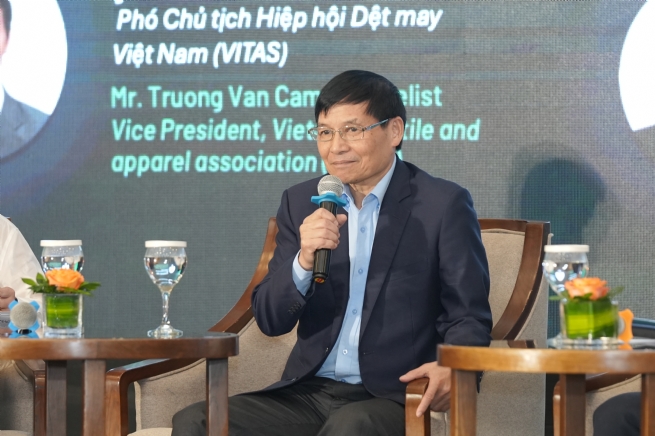Vietnamese Entrepreneurs and Journey of Value Creation
Over nearly four decades of Doi Moi (Renovation), Vietnamese entrepreneurs have grown steadily, becoming pioneers in industrialization, modernization, and global integration. They not only create material wealth but also shape new values for the economy, contributing to affirming Vietnam’s position on the global economic map.
Pillars of development and integration
Since the launch of Doi Moi in 1986, entrepreneurs have gradually proven their indispensable role in the economy. From small production workshops, private enterprises have become a key growth engine, creating jobs, contributing to the state budget, and driving exports. Today, Vietnam has more than 970,000 operating enterprises, with the private sector contributing about 60% of GDP and accounting for 85% of total employment nationwide.

In a volatile global economy, Vietnamese entrepreneurs remain committed to innovation and agile adaptation. They are expanding production, investing in high technology, renewable energy, and semiconductors, while also leading in digital economy sectors such as e-commerce, logistics, and service exports. Many Vietnamese brands have established a strong international presence, including Vingroup, FPT Corporation, Viettel Group, Vietnam Dairy Products Joint Stock Company (Vinamilk), Truong Hai Group Corporation (Thaco), Hoa Phat Group, and Masan Group.
Equally noteworthy is the growing spirit of “for the community.” When natural disasters, pandemics, or social upheavals occur, enterprises do not stand aside. They contribute to social funds, invest in education, startups, and healthcare, and launch initiatives for the environment. “Corporate social responsibility is no longer just a voluntary commitment but a fundamental requirement for competitiveness and sustainable growth in today’s economy,” emphasized economist Pham Chi Lan.
These contributions not only spur growth but also foster social trust, transforming the image of Vietnamese entrepreneurs from simple businesspeople into true partners in national development.
Entrepreneurs of a new era: innovation, creativity, and global aspiration
As Vietnam enters the era of digital transformation and deeper integration, entrepreneurs face both opportunities and challenges. The economy grew by 7.09% in 2024, and growth is forecast to accelerate in 2025, with the private sector expected to serve as the main driver.
Against this backdrop, a new generation of entrepreneurs and enterprises is emerging with a different profile: dynamic, creative, globally oriented, and deeply committed to sustainability. They aim not only for profit but also for long-term value creation, focusing on technological innovation, green development, circular supply chains, and environmentally friendly products. Companies such as VinFast Auto Ltd., TH Group, Vinamilk, Phenikaa Group, Thanh Cong Textile Garment Investment Trading JSC, VNG Corporation, and Dat Bike Company Limited exemplify this new wave of businesses committed to innovation and sustainable development.
The digital transformation wave is particularly noteworthy, enhancing competitiveness across industries. Many enterprises are applying artificial intelligence, big data, and automation in production, management, and marketing. This not only reduces costs but also improves efficiency, transparency, and data-driven decision-making. FPT, Viettel, and VNPT are pioneers in national digital transformation, now expanding into regional and global markets.
The journey of renewal, however, is not without obstacles. Most Vietnamese enterprises remain small and medium-sized, facing challenges in accessing capital, high-quality human resources, and international markets. Yet the determination of Vietnamese entrepreneurs remains a strong foundation. They learn quickly, connect deeply with global networks, and consistently embody the spirit of “Vietnam reaching further.” Some enterprises have become partners in global supply chains, such as Thaco Auto Corporation, Viet Tien Garment Corporation, and Minh Phu Seafood Corporation, actively participating in advanced industries including high technology, renewable energy, and processed exports.
Beyond business ambition, many new-generation entrepreneurs view contributing to society as both a responsibility and a mission. Community startup programs, scholarship funds, environmental projects, and initiatives supporting children and vulnerable groups are being widely implemented.
These efforts reflect a clear shift in vision: development driven by innovation, business ethics, and social responsibility. This forms the foundation for Vietnam to achieve its goal of becoming a high-income country by 2045, with the private sector truly serving as the key driver of the economy.
Leveraging advantages, overcoming tariff challenges for a sustainable textile industry Truong Van Cam Standing Vice Chairman cum Secretary General, Vietnam Textile and Apparel Association (VITAS) In the first nine months of 2025, Vietnam’s textile and garment exports were estimated at US$34.7 billion, up 7.7% year-on-year, with strong growth in major markets: the U.S. up 11.8%, the EU up 12.4%, Japan up 7.8%, and China up 9.9%. Within the EU, some markets recorded particularly high growth, such as the Netherlands (up 10.4%) and Germany (up 17.5%). On the import side, Vietnam imported raw materials and accessories from 30 countries, with China making up 59% of the total. Imports from the U.S. rose nearly 57%, accounting for 7.6%. After the U.S. imposed reciprocal tariffs, Vietnamese firms boosted exports, but the 20% duty on Vietnamese goods, rising to 40% if deemed transshipment, poses major challenges with higher costs, lower profits, and reduced resources for worker welfare, digitalization, and green production. Vietnam still holds relative advantages over 10 direct textile competitors in the U.S. market. Tariffs stand at 30% for China, 50% for India, and 25% for Mexico. Vietnam’s 20% rate matches Bangladesh, is slightly higher than Cambodia, Indonesia, and Pakistan (19%), but less favorable than the EU and Turkey (15%) and Honduras (10%). The biggest challenge is rising logistics costs, and if global garment prices surge, U.S. demand may decline, making it essential to negotiate export prices at reasonable levels. In the long run, the key solution is to diversify both exports and imports. On the export side, Vietnam needs to tap potential markets such as the EU, the UK, Russia, CPTPP members, and ASEAN. On the import side, suppliers should be expanded to Taiwan (China), the U.S., South Korea, and others. More importantly, Vietnam must strengthen its supporting industries by producing fabrics and materials domestically, while also exploring overseas investments in countries like Pakistan and Egypt to leverage advantages. Vietnam must continue to roll out national trade promotion programs with support from the Ministry of Industry and Trade (MoIT) and the commercial counselor network. At the same time, efforts should be made to attract investors with strong capital and technology into Vietnam. The government has issued Decree 205/2025/ND-CP, dated July 14, 2025, amending and supplementing a number of articles in Decree 111/2015/ND-CP on encouraging supporting industry development. MoIT is also finalizing a draft Law on the Development of Key Industries. These are critical steps that will create a stronger legal framework and momentum for the textile and garment sector to achieve sustainable growth in the years ahead.
Many drivers supporting private sector development Nguyen Van Vice Chairman, Hanoi Supporting Industries Business Association (HANSIBA); Vice Chairman, N&G Group After 40 years of Doi Moi (Renovation), the Party, State, and Government of Vietnam have paid close attention to the challenges facing the private sector. Yet the structure of private enterprises shows that the vast majority are small and medium-sized enterprises (SMEs), making up as much as 98%. Many businesses still struggle to apply new science and technology, enhance production capacity, pursue export markets, or integrate into global supply chains. In addition, limited access to capital, land, and infrastructure continues to pose barriers to private sector growth. In supporting industries, private enterprises face not only these general challenges but also specific issues such as outdated machinery and a shortage of highly skilled labor. Nevertheless, private businesses in Vietnam are also seeing many opportunities. The economy is on a steady growth trajectory, supported by a domestic market of over 100 million consumers. Vietnam has signed and is implementing numerous bilateral and multilateral free trade agreements (FTAs) with economies and countries around the world. At the same time, the country’s attractiveness as an investment destination for multinational corporations has created significant opportunities for local supporting industry enterprises. In particular, key directives and policies such as Resolution No. 68-NQ/TW on private sector development and Resolution No. 57-NQ/TW on innovation and technology provide exactly what the business community needs at this stage. The guiding principles and objectives outlined in these Resolutions are becoming a compass for enterprise operations in the new era - the era of Vietnam’s rise. The Government’s bold reforms to streamline the administrative apparatus and reorganize local government boundaries are ensuring that businesses benefit from practical, needs-based mechanisms and policies. Notably, measures to support private enterprises in accessing capital and infrastructure, promoting science and technology application, and accelerating digital transformation are being applied “fairly” to all economic actors. These efforts are gradually resolving past obstacles while further strengthening the entrepreneurial spirit, innovation capacity, and production capability of private enterprises.
Efforts to build a seamless and secure payment ecosystem Vu Ngoc COO, 9Pay joint stock company The year 2025 has been highly challenging as global economic volatility has affected many Vietnamese enterprises. Still, Vietnam’s macroeconomic outlook continues to show positive signs. The country is carrying out multiple tasks and measures to reach its 2025 GDP growth target of 8.3-8.5%. Notably, the Government’s strategy for innovation and digital economy development has become a “guiding compass,” creating valuable opportunities for economic recovery and breakthroughs. A landmark policy has been Resolution No. 68-NQ/TW on private sector development. This represents a breakthrough in both policy thinking and design, laying the foundation for digital transformation and financial infrastructure development. At the same time, the national innovation strategy and the establishment of international financial centers in Ho Chi Minh City and Da Nang have created new opportunities, especially in technology and finance. Fintech companies like 9Pay benefit from favorable policies on taxation, R&D costs, and access to capital and resources, empowering them to develop new solutions, increase technological content in financial products, deliver value to enterprises and individual consumers, and foster healthy competition and innovation. We believe the sustainable development of the digital economy cannot be achieved without the participation of micro, small, and medium enterprises (MSMEs), nano SMEs, and household businesses - the essential “cells” of the economy. This is why we continually innovate our thinking and products, providing comprehensive digital payment solutions. For SMEs in Vietnam and abroad, 9Pay offers payment gateway services and collection/disbursement support, enabling businesses and their customers to transfer and receive money quickly. For nano SMEs and household businesses, the Loa TingTing solution helps manage finances easily and supports digital adoption through tools such as voice payment notification speakers, e-invoices, digital signatures, and point-of-sale software. By building a seamless and secure payment ecosystem, 9Pay is helping bring digital finance to every corner of the economy, turning the opportunities created by Resolution 68 into tangible value for Vietnam’s business community. With an unwavering spirit of innovation, we believe Vietnamese enterprises will remain a powerful driving force, propelling the economy toward its ambitious growth targets in the years ahead.
Enterprises shift away from traditional industrial hubs, prioritizing green facilities and flexible leasing in Vietnam John Campbell Director, Industrial Services at Savills Vietnam Flexibility and strategic accessibility have become key criteria in site selection. Many companies are expanding into provinces such as Tay Ninh, Quang Ninh, and Hung Yen, rather than focusing only on traditional hubs like Binh Duong or Bac Ninh. In addition, the trend of building dual distribution centers, one in the North to serve China and one in the South targeting ASEAN, is becoming increasingly common. At the same time, demand for short-term and flexible leases is rising sharply, particularly in sectors such as e-commerce, last-mile delivery, and third-party logistics (3PL). New entrants from China, Korea, and Europe also prefer these contracts to test the market. In contrast, multinational corporations and large manufacturers continue to prioritize long-term leases or build-to-suit models to secure space and manage costs effectively. A notable example is the Logicross Nam Thuan projects in Tay Ninh - high-spec, ready-built warehouses strategically designed to meet the large-scale leasing needs of e-commerce and express delivery businesses. While base rents in Vietnam remain competitive, many occupiers are now placing greater emphasis on evaluating the total cost of ownership (TCO), which includes service fees, utilities, maintenance, and delivery expenses amid traffic congestion - a critical factor for energy-intensive cold storage. Beyond costs, ESG considerations and green building standards such as LEED and EDGE are becoming increasingly decisive in leasing choices. Many multinational corporations and major retailers now require facilities with green certification, and features such as solar energy, LED lighting, and water recycling systems are emerging as clear competitive advantages. This trajectory reflects broader developments in Vietnam. As the global market stabilizes, Vietnam continues to attract strong international investor interest, not only because of its cost advantages and strategic location but also thanks to the availability of modern, efficient facilities that enable better cost control in the long run.
Sustainable development - Key to prosperous future for businesses and society Binu Jacob CEO, Nestlé Vietnam; Co-Chair, Vietnam Business Council for Sustainable Development (VBCSD) Sustainable development is no longer an option but an essential direction to secure a prosperous future for both businesses and society. At Nestlé Vietnam, we remain committed to our “Creating Shared Value” philosophy, which means expanding the business while at the same time bringing benefits to people, communities, and the planet. Step by step, we are reshaping our entire value chain to cut carbon emissions, promote the circular economy, and protect natural resources. In agriculture, the NESCAFÉ Plan has been in place for more than a decade, helping tens of thousands of Vietnamese farmers apply regenerative farming practices. These practices reduce water consumption, chemical fertilizers, and greenhouse gas emissions while at the same time improving productivity and income. This provides clear evidence of Nestlé’s long-term commitment to building a regenerative food system, where every product created makes a positive contribution to both people and the environment. The Nestlé Needs YOUth program continues to expand, equipping Vietnam’s young generation with skills and innovative thinking for the digital era. Between 2024 and 2025 alone, more than 25,000 young people received training, coaching, and career guidance through the program. Our goal is to positively impact 100,000 young Vietnamese by 2030, thereby contributing to the development of a high-quality future workforce. We believe that sustainability and profitability are not separate, but rather two sides of the same growth equation. A business can only grow sustainably when society and the environment progress together. Guided by this belief, Nestlé Vietnam will continue investing in green technologies, digital transformation, and innovation to help build a greener, more prosperous, and inclusive Vietnam. |













